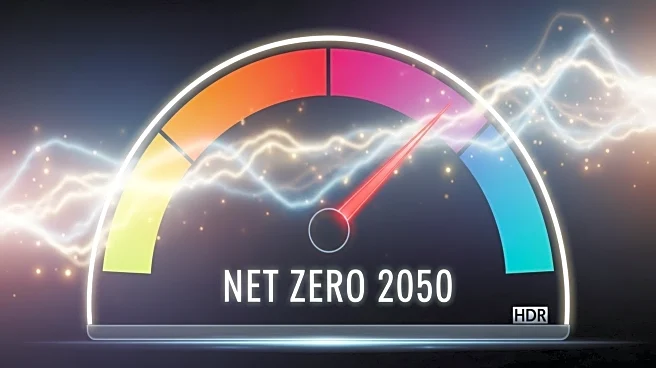What is the story about?
What's Happening?
U.S. Energy Secretary Chris Wright has expressed strong skepticism about the feasibility of achieving net zero emissions by 2050, describing the target as a 'colossal train wreck.' His remarks were made during an interview with the Financial Times and shared by the U.S. Department of Energy on social media. Wright, who is set to attend the Gastech energy conference in Milan, Italy, alongside Interior Secretary Doug Burgum, criticized the net zero goal as an unrealistic and economically damaging initiative. The net zero target aims to balance carbon emissions with carbon removal, a goal adopted by over 140 countries, including major polluters like the U.S., India, and the European Union. Wright, a former oil and gas executive, acknowledged climate change as a significant global issue but criticized what he termed 'climate alarmists.' His comments have been met with criticism from scientists who argue that his views are misinformed.
Why It's Important?
The skepticism expressed by a high-ranking U.S. official like Energy Secretary Chris Wright could influence the country's climate policy and its commitment to international climate agreements. The net zero by 2050 target is a cornerstone of global efforts to limit global warming to 1.5 degrees Celsius, as outlined in the Paris Agreement. Wright's comments may resonate with industries reliant on fossil fuels, potentially affecting policy decisions and investment in renewable energy. Conversely, environmental advocates and scientists may see this as a setback in the fight against climate change, emphasizing the need for urgent action to mitigate its impacts. The debate highlights the tension between economic interests and environmental sustainability, with significant implications for U.S. energy policy and international climate commitments.
What's Next?
As Wright and Burgum prepare for the Gastech energy conference, discussions on the future of energy policy and climate commitments are likely to intensify. The U.S. may face pressure from international partners to reaffirm its commitment to the net zero target. Domestically, Wright's comments could spark debate among policymakers, environmental groups, and industry stakeholders about the best path forward for U.S. energy policy. The outcome of these discussions could influence future legislation and regulatory measures aimed at reducing carbon emissions. Additionally, the scientific community may continue to challenge Wright's views, advocating for evidence-based approaches to address climate change.
Beyond the Headlines
Wright's remarks underscore a broader ideological divide over climate policy, reflecting differing views on the balance between economic growth and environmental protection. This divide may influence public opinion and voter priorities, particularly as climate change becomes an increasingly prominent issue in political discourse. The debate also raises ethical questions about the responsibility of high-income nations to lead global efforts in reducing emissions, given their historical contributions to climate change. Long-term, the U.S.'s stance on climate policy could affect its global leadership role and its ability to collaborate with other nations on environmental issues.














